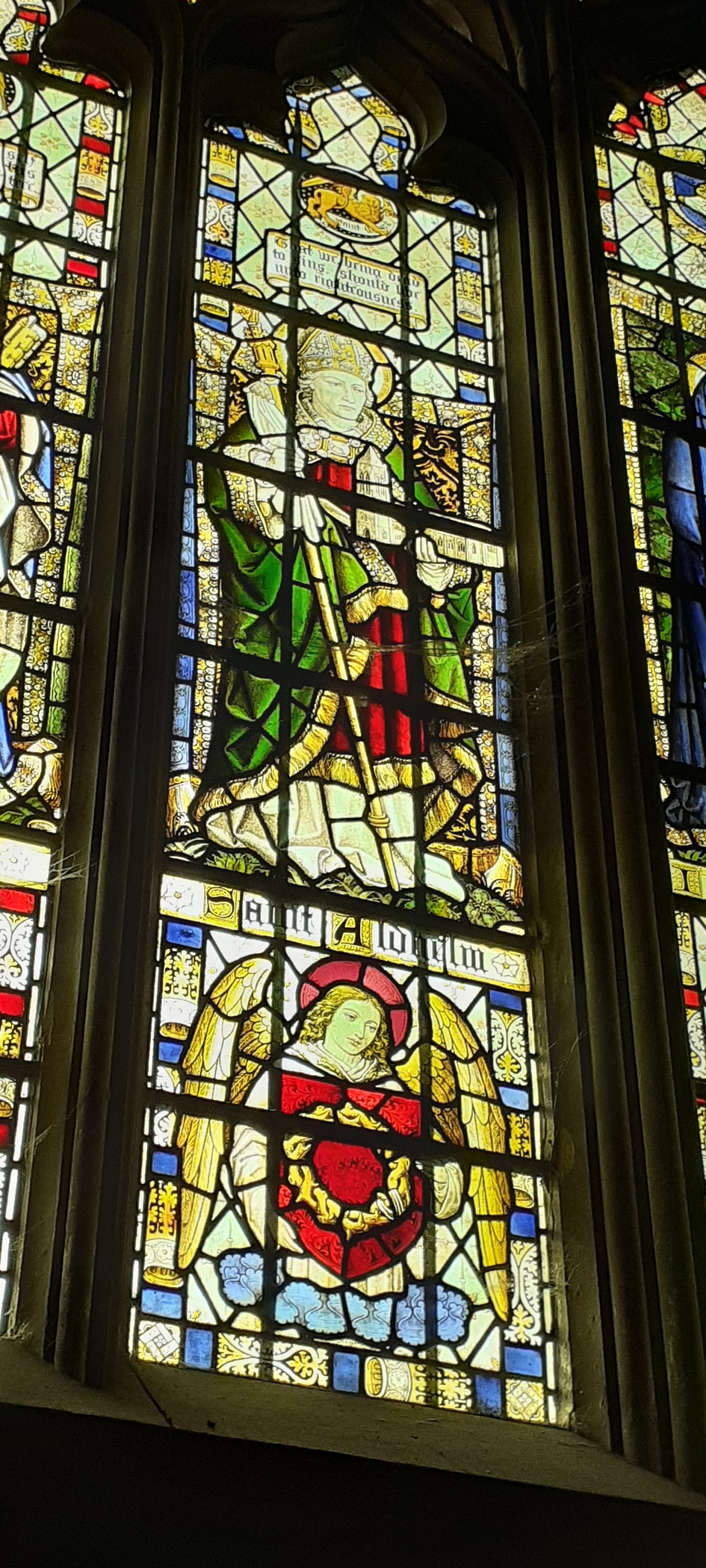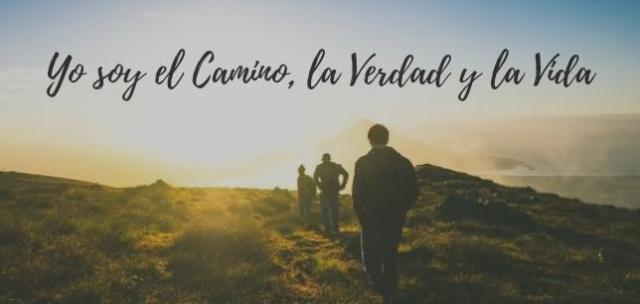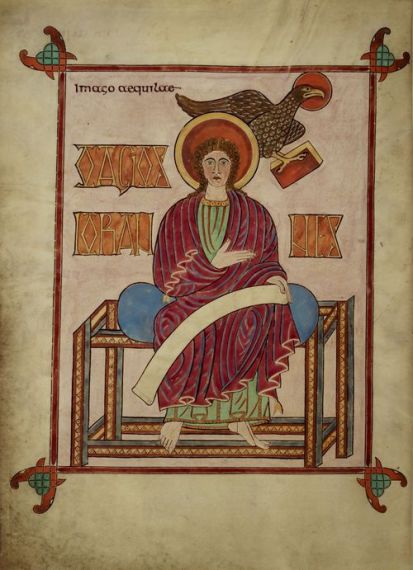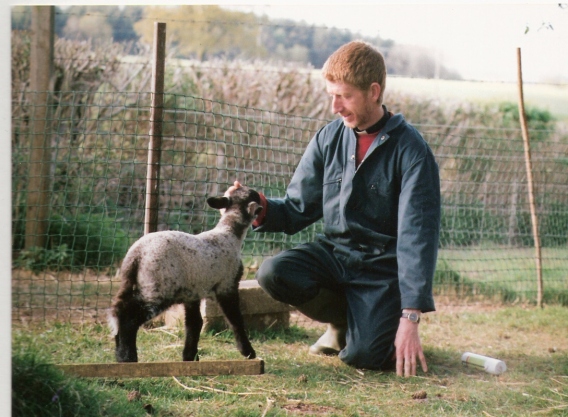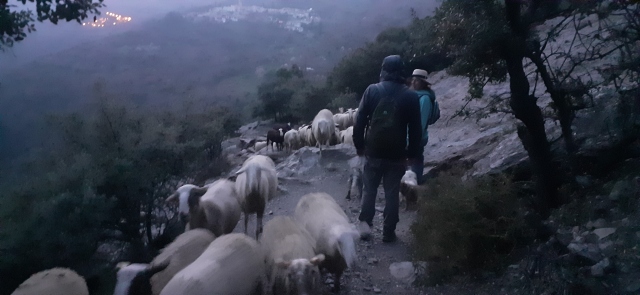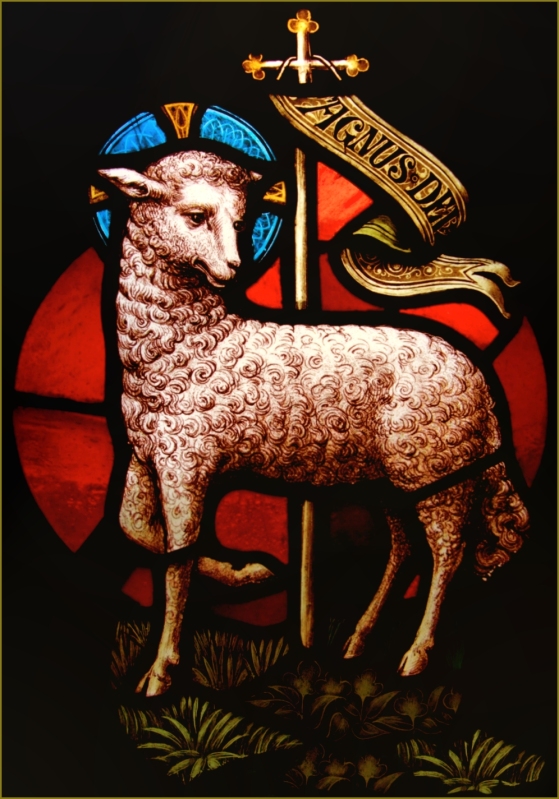La homilía en las Misas en la iglesia de St Aldhelm, Branksome, el domingo 24 de mayo, 2020. Versiones en español y en inglés.
The address given during the Eucharists celebrated at St Aldhelm´s, Branksome, on Sunday 24th May, 2020. Spanish and English versions.
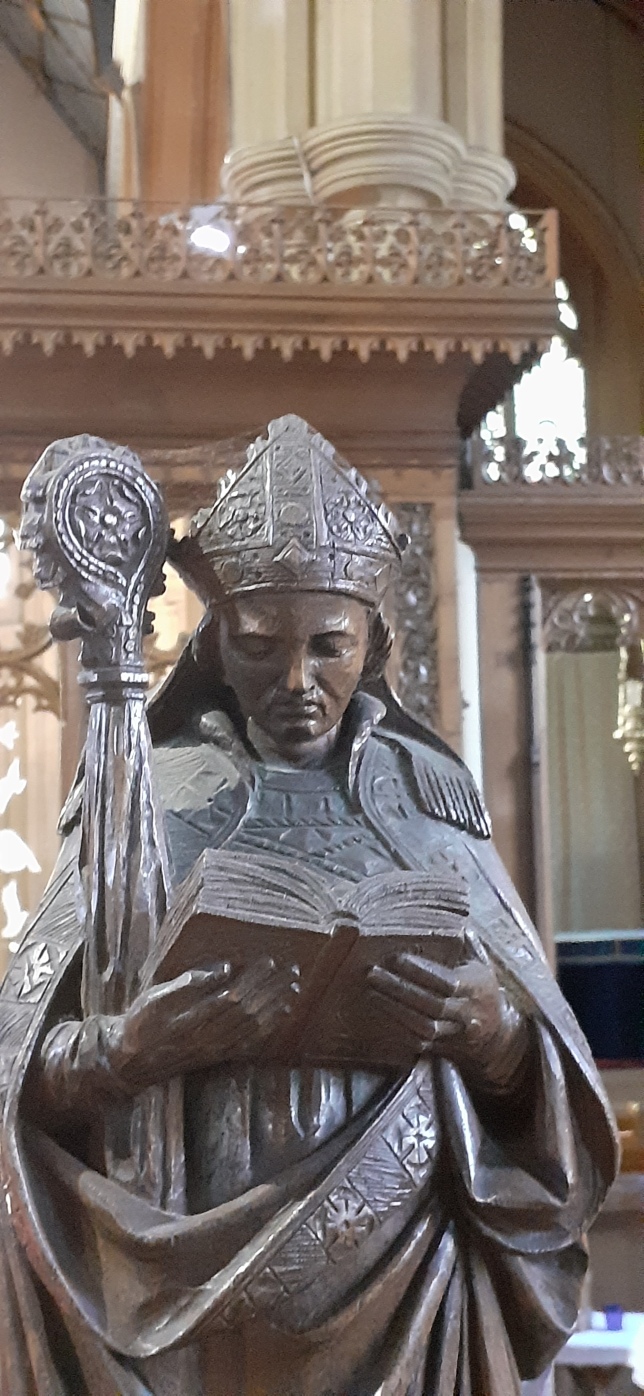
El jueves pasado celebramos la Ascensión de Cristo. Por este misterio, ‘la vertical del cielo atravesa el horizonte de este mundo y la gloria de Dios brilla alrededor de nosotros.’ Esta metáfora se demuestra en las torres y las agujas de muchas iglesias, que nos llaman mirar más lejos que podamos ver.
Pero después del milagro en la colina con los ángeles y el nube, los discípulos volvieron a la ciudad, a Jerusalén, al apartamento arriba donde vivían con María, otros parientes y amigas de Jesús. Allí, rezaron juntos y esperan el venido de su Señor, que ocurrirá en el don del Espíritu en Pentecostés.
Pero, durante esa época, todavía tenían que hacer las compras y las tareas de casa. Me gustaría imaginar que los discípulos – hombres jóvenes – los compartieron los hechos de casa, pero no sé… No obstante, a pesar de la Ascensión que junta el cielo con la tierra, por cierto necesitaron continuar vivir en el mundo con sus necesidades y exigencias.
Para nosotros también debemos vivir como habitantes de dos mundos. Nos moramos en este mundo terrestre pero a la misma vez tenemos nuestra ciudadanía en el paraíso de los cielos. Los santos tienen la capacidad de estar con los ángeles mientras limpian los platos pero para mí esto es demasiado difícil.
¿Qué puede ayudarnos en este reto? ¿Qué puede fortalecernos cuando la vida es difícil? ¿Qué puede animarnos en faz de los desengaños y los sufrimientos que sufren tanta gente?
Primero, pienso que la honestidad es imprescindible. Quizás tenemos un Señor de los señores pero todavía somos seres humanos, no magos, ni ángeles. Luchamos como otros, nos cansamos, nos debilitamos, y nos fracasamos como otros – y a veces más que ellos. Honestidad además uno con otro. Por eso el ambiente de nuestra fraternidad significa mucho. Hace unos meses empecé un grupo para los hombres. Somos solamente cuatro porque después de unas semanas el lockdown nos previno expansionarlo y reunimos actualmente por Zoom. Pero creemos que es necesario, un lugar abierto, honesto y confidencial. Entonces, le pregunto: ¿tiene usted un lugar de honestidad y realidad? Si no, necesítalo?
Siguiente, oración, o meditación, o cualquier cosa que le ayuda alcanzar una perspectiva más larga, arriba de la vida cotidiana, la vida insistente. Para mucha gente, esta época de lockdown ha sido una oportunidad, bienvenido o no, de enfocar otra vez, una oportunidad de pensar y rezar y contemplar. Pero lo necesitamos esto siempre. Este templo ha estado aquí durante toda la historia de este zona urbana, como símbolo de la oración y de la presencia de Dios. Creo que en esta temporada la gente lo necesita más que nunca. Entonces, pregunto, ¿tiene usted un lugar, un espacio, una oportunidad de pensar y reflexionar? ¿Si no, necesítalo?
La Biblia nos apoya también. No tiene respuestas sencillas para las preguntas más difíciles. No puede explicar el sufrimiento de los niños, la crueldad de la humanidad. Pero por medio de la Biblia nos acompaña otra gente de todos tipos que han pasado antes, con su errores, su ira, sus fracasos, sus pecados, su amabilidad, su esperanza, su fuerza, su flaqueza – cada uno, como nosotros, pecador e hijo de Dios. Sea nuestra morada en el corte de un rey, o en el bar de Eastenders, la gente de la Biblia nos acompaña y revela a nosotros nuestros sueños y nuestras pesadillas, nuestra realidad, y nuestra posibilidad. Pregunto: ¿puede usted acceder a la Bíblia? Entiendo que no es fácil, pero me gustaría ayudarle si sea posible.
Enfocar en Jesús nos da esperanza y compasión. El mundo – como usted, como yo – necesitamos esperanza y compasión. Jesús crucificado ha sufrido y ha muerto con y por este mundo entero. Jesús resucitado ha vencido el poder de la muerte y el oscuro de desesperación. Jesús ascendido ha llevado nuestra carne en los cielos, para que podamos tener esperanza en medio de los problemas terrestres. El Primado de la iglesia episcopal un los EEUU ha dicho que la iglesia es sencillamente el Movimiento de Jesús. Estamos en camino con Cristo. La estructura de la Iglesia, sea la iglesia católica, anglicana, evangélica, es necesario y servicial pero no es lo más importante. Lo más importante es la presencia de Jesús. Pregunto: ¿en este momento, se parece a usted que Jesús está cerca o lejos de usted? No hay respuesta correcta. Pero creo que si le decimos a él, nos ayudará.
Paradojamente, creo que las capacidades lo más importantes, que Dios ha plantado en nosotros humanos, son ellas de reír, y de llorar. Por eso, cuando visito – no, cuando visitaba antes de la crisis… – los enfermos en el hospital y la gente en las casas, me gustó firmar una tarjeta de saludos con un dibujo sencillo: una cara sonriendo pero con unas lágrimas en uno de sus ojos – porque por las lágrimas y las épocas difíciles…el amor crece más profundo.
Que Jesús crucificado, resucitado y ascendido los acompaña en su camino, en su soledad y en su vida familial y en su trabajo (o en su falta de trabajo…) Que se ríe con ustedes y que lloran con ustedes, para que puedan ustedes comparten risas y lágrimas con las personas que encuentran ustedes en su camino. Amen

On Thursday we celebrated the Ascension of Christ. ‘The verticality of heaven pierces the horizontal of earth and the glory of God blazes round us.’ This metaphor is reflected in the towers and steeples of many churches that seem to summon us to look further than we can see.
Following the miracle on the mountain top and amid the cloud, however, the disciples returned to the city, to Jerusalem, to the upper floor flat where they lived with Mary, other family members and women friends of Jesus. There, they prayed together and awaited the coming of their Lord, something that occurred 10 days later (as we measure it in our church calendar) in the gift of the Holy Spirit at Pentecost.
No doubt throughout this time they would have had to resume all the usual household tasks, the shopping and the cleaning. I like to imagine that the young, male disciples shared all those jobs, but I don’t know… But what is clear is that despite the Ascension that joins heaven and earth, for sure they had to keep on living in this world with its demands and challenges.
We too must live as inhabitants of two different worlds. We dwell in this earthly domain, yet at the same time we are citizens of heaven. True saints have the ability to be with the angels even while they wash the dishes, but for me this is too difficult.
What might help us in this challenge? What is able to strengthen us when life is tough? What can encourage us in the face of the disappointments, and the suffering of so many?
First, I think that honesty is essential. Maybe we do have a Lord of lords but nevertheless we remain human beings, not angels. We struggle just like others, we get tired, weak and we fail just like others – and at times perhaps more than others. Honesty too one with another. For this reason the quality of our fraternity, our community, matters a good deal. A few months ago we started a group for men, called Fellaship. There are only four of us because after the first few weeks of meeting the lockdown came and prevented us convening, and from expanding even if others had wanted to come and see. But we meet meanwhile on Zoom and we believe it is a necessary, open space where we can talk with honesty and in confidence. Do you have a place of honesty and reality? If not, do you need one?
Next, prayer, or meditation, or whatever enables you to gain a perspective on the domination of each day’s concerns. For many this time of lockdown has been an opportunity – whether or not a welcome one – to pray and contemplate. We need something of the kind constantly, however. It is in part for this reason that this holy building has been here throughout the history of this urban area, as a symbol of prayer and the presence of God. I believe that in this present period we need such a reminder more than ever. Do you have a regular place, or a time, to help you pray?
The Bible supports us as well. It doesn’t provide simple answers to our difficult questions. It cannot explain satisfactorily or clearly why children suffer, nor the cruelty carried out by people against people. But by means of the Bible we find ourselves in company with those before us, with their mistakes, their anger, their failures, their sins, their kindness, their strength, their weakness. Be our domain within a King’s court or in an Eastenders’ bar, the people of the Bible accompany us and reveal to us our dreams and our nightmares, our reality, and our possibility. Are you able to engage with the Bible? It isn’t easy, I know! But I and others would be glad to help if you ask.
To focus on Jesus lends to us hope and compassion. Jesus crucified has suffered and died for this world in its entirety. Jesus risen has defeated the power of death and the darkness of despair. The ascended Jesus has lifted our flesh into the heavenly realm, so giving us hope here among our problems on earth. The Primate of the American Episcopal Church has said that the church can be simply described as the Jesus Movement. We are on the road with Christ. The church’s structure, be it Roman Catholic, Anglican, Protestant or whatever, is necessary and useful but is not the most important thing. What matters is the presence of Jesus on our pilgrimage, our daily journey within this world. Do you feel close to, or far removed from, Jesus? There is no correct answer to that question, but I think that if we are honest with him then he will find a way to help us.
Paradoxically, I believe that the most important capabilities that God has implanted in us humans are those of laughter and tears. As a result, when I visit – or used to visit, before these days of social distancing and shielding – the sick in hospital and people in their homes, I used to sign a greetings card with a simple drawing: a smiling face with some tears falling from just one of the eyes, because though the tears and the tough times…love grows deep.
May Jesus crucified, risen and ascended accompany you on your journey, in your loneliness and in your family and with your friends. May you know his laughter and tears joined with yours, so that you can share the tears and laughter of those whom you meet along the way. Amen.
